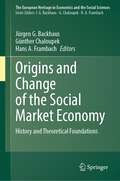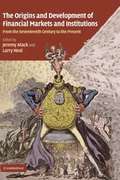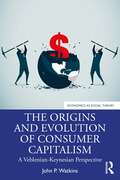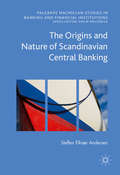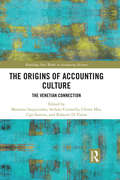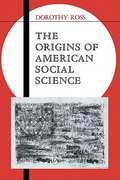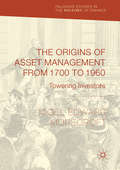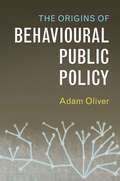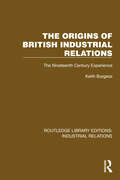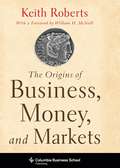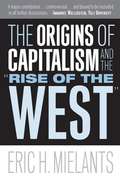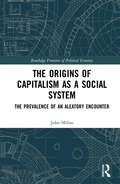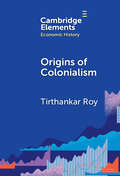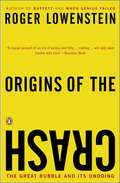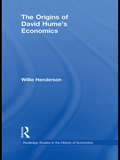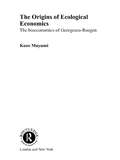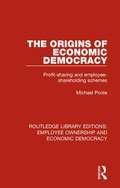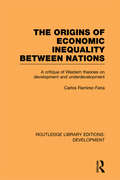- Table View
- List View
Originate, Motivate, Innovate: 7 Steps for Building a Billion Dollar Network
by Shelly Omilade BellSupercharge your business or career by staying true to your authentic self In Originate, Motivate, Innovate: 7 Steps to Building a Billion Dollar Network, accomplished entrepreneur Shelly Omilâdé Bell and author Sheena C. Howard deliver an honest and engaging discussion of how to think differently about getting your business funded as a female entrepreneur of color. In the book, you’ll find the mindsets, tools, tactics, and strategies you need to succeed in a venture capital environment that is largely designed by—and for—white males. You’ll learn how to apply your own unique story and background and prioritize valuable relationships to create your own pathway to a fully funded business. You’ll also discover: An acknowledgment and highlighting of those obstacles that remain in place and stand in the way of women of color in business How to break through those obstacles while doing things your own way Strategies for achieving your next goal, whether that’s building a business, creating social impact, or looking for a raise An essential and insightful resource for entrepreneurs, founders, and other business leaders of color, Originate, Motivate, Innovate is the no-nonsense, hands-on book that professional women of color have been waiting for.
Origins and Change of the Social Market Economy: History and Theoretical Foundations (The European Heritage in Economics and the Social Sciences #26)
by Jürgen G. Backhaus Günther Chaloupek Hans A. FrambachThis edited volume addresses the theoretical and historical foundations of the German Social Market Economy. Written to commemorate the 75th anniversary of the establishment of the Social Market Economy, chapter contributions discuss the ideas of its theoretical founders—Walter Eucken, Alfred Müller-Armack, Wilhelm Röpke, and Franz Böhm--as well as related influences such as Ordoliberalism, the historical school of economics, and the Catholic social doctrine. In addition, chapters analyze differences and parallels to alternative policy concepts, in particular Keynesianism. Finally, the volume turns toward contemporary discussions of the Social Market Economy in the present political and economic context, specifically its ability to cope with current challenges. Providing rich context for the establishment of Germany’s contemporary economic system, this volume will be of interest to researchers and students of political, social and economic systems, the history of economic thought, and political history.
The Origins and Consequences of Property Rights: Austrian, Public Choice, and Institutional Economics Perspectives (Elements in Austrian Economics)
by Colin Harris Meina Cai Ilia Murtazashvili Jennifer MurtazashviliProperty rights are the rules governing ownership in society. This Element offers an analytical framework to understand the origins and consequences of property rights. It conceptualizes of the political economy of property rights as a concern with the follow questions: What explains the origins of economic and legal property rights? What are the consequences of different property rights institutions for wealth creation, conservation, and political order? Why do property institutions change? Why do legal reforms relating to property rights such as land redistribution and legal titling improve livelihoods in some contexts but not others? In analyzing property rights, the authors emphasize the complementarity of insights from a diversity of disciplinary perspectives, including Austrian economics, public choice, and institutional economics, including the Bloomington School of institutional analysis and political economy.
The Origins and Development of Financial Markets and Institutions
by Jeremy Atack Larry NealCollectively, mankind has never had it so good despite periodic economic crises of which the current sub-prime crisis is merely the latest example. Much of this success is attributable to the increasing efficiency of the world's financial institutions as finance has proved to be one of the most important causal factors in economic performance. In a series of insightful essays, financial and economic historians examine how financial innovations from the seventeenth century to the present have continually challenged established institutional arrangements, forcing change and adaptation by governments, financial intermediaries, and financial markets. Where these have been successful, wealth creation and growth have followed. When they failed, growth slowed and sometimes economic decline has followed. These essays illustrate the difficulties of co-ordinating financial innovations in order to sustain their benefits for the wider economy, a theme that will be of interest to policy makers as well as economic historians.
The Origins and Development of Silicon Valley
by Tom Nicholas James LeeOn October 1, 1891, as Senator Leland Stanford cut the ribbon at the ceremony gifting 8,000-acres of his Palo Alto, California, stock farm to a new, 559-student university bearing his name and seeking to produce "useful" in addition to "cultured" graduates, the majority of onlookers were orange groves and wildflowers. There was, as Gertrude Stein would remark of nearby Bay Area city, Oakland, nearly 50 years later, almost "no there, there." That is, it was a place with little social depth, identity, or culture. But over time, the region became synonymous with a culture of entrepreneurialism and developed into the most significant innovation hotspot in the world. What factors, if any, made what was to become known as "Silicon Valley" unique? Will Silicon Valley remain a vibrant community of technological innovation and economic growth, or will it decline like other previously thriving U.S. regions?
The Origins and Evolution of Consumer Capitalism: A Veblenian-Keynesian Perspective (Economics as Social Theory)
by John P. WatkinsConsumer capitalism arose with the second industrial revolution, the application of continuous-mass production to consumer goods during the late nineteenth and early twentieth centuries. This book adopts a Veblenian, Keynesian viewpoint, presenting an evolutionary view of consumption combined with the need to increase demand to match increases in production. The book traces the history of consumer capitalism, examining the paradox posed by applying continuous-mass production to produce armaments for dynastic ambitions versus consumer goods for the masses, manifesting itself in the world wars of the twentieth century. Multiple paradoxes at the heart of the story address booms leading to busts, over-producing countries in Asia relying on over-consuming countries in the West, and the expansion of demand depending on increasingly inventive ways of liquefying assets, in light of stagnant incomes. The book persuasively argues that these paradoxes result from capitalism’s incessant drive to accumulate capital, fostering conflict, crises, and depression. The latest paradox results from the impact of continuous-mass production on the environment, manifesting itself as the Darwinian dilemma. The dilemma stems from human beings largely winning the struggle for existence and, in the process, possibly making the earth uninhabitable, at least for humans.
The Origins and Evolution of the Single Market in Europe (Routledge Revivals)
by Bill LucarelliFirst published in 1999, this work of economic history explores the evolution of the single market and of economic and political integration in Europe since World War II. Beginning with European integration and the genesis of the Customs Union, Bill Lucarelli then proceeds through the Trans-Atlantic Rivalry, the European Monetary Union (EMU) the European Monetary System (EMS) and on to Maastricht. The study intends to be a critique of the prevailing theories of negative integration, weighting economic integration against political integration, with a particular focus on the concept of ‘spill-over’. Lucarelli argues against prevailing functionalist and neo-liberal interpretations of the process of economic integration. The conclusion is critical of the strategy toward European Monetary Union. The book is informed by Marxian and Post-Keynesian Economic theories.
The Origins and Nature of Scandinavian Central Banking
by Steffen Elkiær AndersenThis book explores the formation and evolution of Scandinavian central banks. It begins by defining the nature of "central banking" in general, before moving on to investigate how and when it became meaningful to regard today's Scandinavian central banks as such. It also explores how Scandinavian central banks have conformed to the defined ideals of "central banks" over the last 100 years, clarifying the distinctions between commercial banks and central banks, and between central banks and departments of governments. The author shows how the outbreak of the Great War was the catalyst which fundamentally transformed the originally purely commercial banks into "central banks". The book also analyses how different the three Scandinavian central banks are, how these differences can be explained by the different political and economic circumstances surrounding their original formation, and the differences in the political environments in which they later developed.
The Origins and Nature of Scandinavian Central Banking (Palgrave Macmillan Studies in Banking and Financial Institutions)
by Steffen Elkiær AndersenThis book explores the formation and evolution of Scandinavian central banks. It begins by defining the nature of “central banking” in general, before moving on to investigate how and when it became meaningful to regard today’s Scandinavian central banks as such. It also explores how Scandinavian central banks have conformed to the defined ideals of “central banks” over the last 100 years, clarifying the distinctions between commercial banks and central banks, and between central banks and departments of governments. The author shows how the outbreak of the Great War was the catalyst which fundamentally transformed the originally purely commercial banks into “central banks”. The book also analyses how different the three Scandinavian central banks are, how these differences can be explained by the different political and economic circumstances surrounding their original formation, and the differences in the political environments in which they later developed.
The Origins, History, and Future of the Federal Reserve
by Michael D. Bordo William RoberdsThis book contains essays presented at a conference held in November 2010 to mark the centenary of the famous 1910 Jekyll Island meeting of leading American financiers and the U. S. Treasury. The 1910 meeting resulted in the Aldrich Plan, a precursor to the Federal Reserve Act that was enacted by Congress in 1913. The 2010 conference, sponsored by the Federal Reserve Bank of Atlanta and Rutgers University, featured assessments of the Fed's near 100-year track record by prominent economic historians and macroeconomists. The final chapter of the book records a panel discussion of Fed policy making by the current and former senior Federal Reserve officials.
The Origins of Accounting Culture: The Venetian Connection (Routledge New Works in Accounting History)
by Massimo Sargiacomo Stefano Coronella Chiara Mio Ugo Sostero Roberto Di PietraThe Origins Of Accounting Culture aim at studying the origins of the accounting culture in Venice, with a specific focus on accounting education. The period covered by the work ranges from Luca Pacioli to the foundation (in 1868) of the Royal Advanced School of Commerce (Regia Scuola Superiore di Commercio), that in 2018 is celebrating its 150 anniversary as Ca’ Foscari University of Venice. Ever since the Middle Ages, Venice was home of a number of favourable circumstances that have been accumulating over the years. As a trading city par excellence, Venice allowed the spreading of the bookkeeping at first among firms and then in the public administration that was much in need of sophisticated accounting principles for the purpose of controlling its activities. Venice was among the first cities to implement Gutenberg print method and it quickly became the most important city in the world in the publishing industry, allowing printing and spreading the first handbooks about double-entry bookkeeping and merchant studies. The Origins Of Accounting Culture goes beyond the study of Luca Pacioli and tackles in a more organic and holistic way the social and economic conditions that allowed the accounting culture to spread in Venice. This book will be a vital resource to academics and researchers in the fields of Accounting, Accounting History, Economic Development and related disciplines.
The Origins of American Social Science: Ideas in Context
by Dorothy RossRoss takes the reader on a journey through social science as practiced in America.
The Origins of Asset Management from 1700 to 1960: Towering Investors (Palgrave Studies in the History of Finance)
by Nigel Edward MorecroftThis book explores the origins and development of the asset management profession in Britain as a distinct activity within financial services, independent of banks and stockbrokers. Specifically, it identifies the main individuals and institutions after 1868 who established the profession. The book draws a distinction between banks (short-term deposit-taking) and asset management (an investment service with longer-term objectives). It explains why some banks fail but asset management businesses generally do not. It argues that asset management has been socially useful and has had a beneficial impact on the development of securities markets by offering choices to savers as an alternative to banks, improving the efficiency of capital allocation, re-cycling excess savings productively and enabling a range of investors - from institutions to individuals - to benefit from thoughtful, long-term investing.
The Origins of Behavioural Public Policy
by Adam OliverThe use of behavioural science to inform policy is one of the main developments in the social sciences over the last several decades. In this book, Adam Oliver offers an accessible introduction to the development of behavioural public policy, examining how behavioural economics might be used to inform the design of a broad spectrum of policy frameworks, from nudges, to bans on certain individual behaviours, to the regulation of the commercial sector. He also considers how behavioural economics can explain and predict phenomena as a challenge to economists' assumptions around how people perceive time, utility and money. The book offers an intellectual foundation for all those concerned with behavioural public policy, from academics, undergraduate and postgraduate students with a diverse range of disciplinary perspectives, such as economics, political science, sociology and anthropology, to policy makers and practitioners working directly with behavioural public policy in their everyday working lives.
The Origins of British Industrial Relations: The Nineteenth Century Experience (Routledge Library Editions: Industrial Relations)
by Keith BurgessThe Origins of British Industrial Relations (1975) traces the beginnings of industrial relations in nineteenth century Britain, looking at the interdependence of economic, political, legal and ideological factors that provide the framework. This important study, focusing on the key sectors of engineering, building, coal mining and cotton textiles, shows how the origins of British industrial relations reflected the changing character of international capitalism during the nineteenth century.
The Origins of Business, Money, and Markets (Columbia Business School Publishing)
by Keith RobertsTo understand business and its political, cultural, and economic context, it helps to view it historically, yet most business histories look no further back than the nineteenth century. The full sweep of business history actually begins much earlier, with the initial cities of Mesopotamia. In the first book to describe and explain these origins, Roberts depicts the society of ancient traders and consumers, tracing the roots of modern business and underscoring the relationship between early and modern business practice. Roberts's narrative begins before business, which he defines as selling to voluntary buyers at a profit. Before business, he shows, the material conditions and concepts for the pursuit of profit did not exist, even though trade and manufacturing took place. The earliest business, he suggests, arose with the long distance trade of early Mesopotamia, and expanded into retail, manufacturing and finance in these command economies, culminating in the Middle Eastern empires. (Part One) But it was the largely independent rise of business, money, and markets in classical Greece that produced business much as we know it. Alexander the Great's conquests and the societies that his successors created in their kingdoms brought a version of this system to the old Middle Eastern empires, and beyond. (Part Two) At Rome this entrepreneurial market system gained important new features, including business corporations, public contracting, and even shopping malls. The story concludes with the sharp decline of business after the 3rd century CE. (Part Three) In each part, Roberts portrays the major new types of business coming into existence. He weaves these descriptions into a narrative of how the prevailing political, economic, and social culture shaped the nature and importance of business and the status, wealth, and treatment of business people. Throughout, the discussion indicates how much (and how little) business has changed, provides a clear picture of what business actually is, presents a model for understanding the social impact of business as a whole, and yields stimulating insights for public policy today.
The Origins of Capitalism and the "Rise of the West"
by Eric H. MielantsIn this study, Eric Mielants provides a novel interdisciplinary interpretation of the origins of modernity and capitalism in particular. He argues that contrary to popular thinking, the Rise of the West should not be analyzed in terms of the Industrial Revolution or the colonization of the New World, but viewed from long-term developments that occurred in the Middle Ages. A fascinating overview of different civilizations in East Asia, South Asia, and Northwestern Africa is provided and systematically compared and contrasted with Western Europe. This book addresses some of the major debates that have recently unfolded in world history, comparative sociology, political economy, sociological theory and historical sociology. Mielants indicates how many existing theories (such as Marxism, World-Systems Theory and Smithian Modernization Theory) have suffered from either Eurocentric or limited temporal and spatial analyses, which prevents them from a complete understanding of why the origins of capitalism and citizenship emerged in Western Europe.
The Origins of Capitalism as a Social System: The Prevalence of an Aleatory Encounter (Routledge Frontiers of Political Economy)
by John MiliosEconomists, historians and social scientists have offered a variety of conflicting answers to the issue of the beginnings of capitalism and these deviating answers imply different conceptualizations of what capitalism actually is. This book provides a simultaneous inquiry into the origins of capitalism as well as provides a theoretical treatise on capitalism. The Origins of Capitalism as a Social System explores the line between what is and is not capitalism, (re)producing a theory of capitalism as a system of class domination and exploitation. Part I of the book focuses on the monetary theory of value and capital developed by Karl Marx, while at the same time critically reviews an array of economic and historical literature, both Marxist and non-Marxist. Following this, Part II expounds the first emergence of capitalism in Venice. It highlights the historical contingencies that made capitalism in the Venetian society possible, as well as the structural elements of the capitalist system and their interconnectedness. Finally, Part III discusses the capitalist character of the Venetian social formation from the end of the fourteenth century until the fall of the republic to Napoleon in 1797. As part of this, the author investigates the significance of forms of governmentality beyond national cohesion and territorialization. Of great interest to economists, historians and both undergraduate and postgraduate students, this book gives special emphasis to a critical evaluation of the tensions and controversies between historians, economists and other social scientists with regard to the character and role that money and trade played in societies and economies.
Origins of Colonialism: Why Geography Mattered (Elements in Economic History)
by Tirthankar RoyHistorians explain the eighteenth-century origin of European colonialism in Asia either with the profile of the merchants or an argument about uneven power. This Element suggests that the environment was an important factor, too. With India (1600-1800) as the primary example, it says that the tropical monsoon climatic condition, extreme seasonality, and low land yield made the land-tax-based empires weak from within. The seaboard supplied a more benign environment. Sometime in the eighteenth century, a transformation began as the seaside traded more, generated complementary services, and encouraged the in-migration of capital and skills to supply these services. The birth of a new state from this base depended, however, on building connections inland, which was still a dangerous and uncertain enterprise. European merchants were an enabling force in doing this. But we cannot understand the process without close attention to geography.
Origins Of The Crash: The Great Bubble And Its Undoing
by Roger LowensteinWith his singular gift for turning complex financial events into eminently readable stories, Roger Lowenstein lays bare the labyrinthine events of the manic and tumultuous 1990s. In an enthralling narrative, he ties together all of the characters of the dot-com bubble and offers a unique portrait of the culture of the era. Just as John Kenneth Galbraith's The Great Crash was a defining text of the Great Depression, Lowenstein's Origins of the Crash is destined to be the book that will frame our understanding of the 1990s.
The Origins of David Hume's Economics (Routledge Studies in the History of Economics)
by Willie HendersonThe book covers Hume’s biographical development; his self appraisal as a 'man of letters’; his philosophical writings with emphasis on their direct and indirect economic content; his self-aware criticism of his approach to the Treatise and the development of his rhetorical understanding of the needs/interests of his readers/potential readers; his rhetorical turn and Ciceronian adjustments to his writing within the genre of the essay, including his two Enquiries; his political essays and his nine essays conventionally classified as economic. The work aims to show how the Treatise and its vicissitudes gave rise to his economics. The work takes a broad approach to Hume and his writings on economic topics from the Treatise, through the Enquires and on to his political and economic essay. The work also explores Hume’s textual method and charts the move from abstruse philosophy to a Ciceronian engagement with social conditions and problems as developed in the Political Discourses. In addition, Hume’s extensive use of analogies is also brought into clearer focus than is found in other texts. Overall, the book will be of great use to both postgraduates and undergraduates alike.
The Origins of Ecological Economics: The Bioeconomics of Georgescu-Roegen (Routledge Research In Environmental Economics Ser. #1)
by Kozo MayumiNicholas Georgescu-Roegen deserves to be called the father of ecological economics. This book connects Georgescu-Roegen's earlier work such as consumer choice theory and a critique of Leontief's dynamic model, with his later ambitious attempt to reformulate the economic process as 'bioeconomics', a theoretical alternative to neoclassical economics.
The Origins of Economic Democracy: Profit Sharing and Employee Shareholding Schemes (Routledge Library Editions: Employee Ownership and Economic Democracy #9)
by Michael PooleThis work, originally published in 1989, examines a highly important phenomenon: the growth of profit-sharing and share-ownership schemes for employees within the company. The Origins of Economic Democracy traces the origins and developments of such schemes internationally, and presents an explanatory framework for understanding their emergence. Both legislation and economic conditions play key roles in determining the popularity of such schemes for companies and their employees. The subject of profit-sharing is of vital importance to companies endeavouring to improve their financial performance while increasing the degree of job satisfaction and organizational loyalty of staff members.
The Origins of Economic Inequality Between Nations: A Critique of Western Theories on Development and Underdevelopment (Routledge Library Editions: Development)
by Carlos Ramirez-FariaFirst published in 1991 this text provides an incisive analysis of theories concerning the origins of economic inequality between nations. Central to the author’s investigation is the concept of underdevelopment, and a focus on successive Western ‘systems of conceptualisation’ of the relationship between the west and the rest of the world. The first part of the book concerns the Marx/Engels theory of the Asiatic mode of production, and the anti-Imperialist reaction against Eurocentrisim initiated by the theoretical synthesis of J. A. Hobson. This is followed by an examination of the post-World War II era, particularly the evolution of development studies and the differing versions of dependency theory. The author concludes with an analysis of the most recent reactions against economic imperialism and dependency theory, and concludes with an assessment of their implications for the further economic development of today’s Third World.
The Origins of Economic Thought in Modern Japan
by Chuhei SugiyamaBy throwing light on economic thought in the period of the Japanese Enlightenment, this book will make clear what led to the institutionalization of business and economic education, the birth of the pioneer business enterprise and of serious economic journalism and the reasons behind the success of Japanese economic development.

